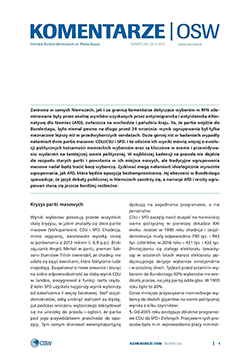Miękka białorutenizacja. Ideologia Białorusi w dobie konfliktu rosyjsko-ukraińskiego
Soft Belarusianisation. The ideology of Belarus in the era of the Russian-Ukrainian conflict
Author(s): Piotr Rudkouski
Subject(s): Governance, Public Administration, Public Law, Economic policy, Government/Political systems, International relations/trade, Developing nations, Geopolitics
Published by: OSW Ośrodek Studiów Wschodnich im. Marka Karpia
Keywords: Belarusianisation; Belarus; Russian-Ukrainian conflict;
Summary/Abstract: Over the past three years, a distinct change has become visible in the ideological discourse of the government of Belarus. To an increasing degree, the state ideology is focusing on strengthening national identity, emphasising the divergence of Belarus’s interests from those of Russia, and re-examining the historical narration in a direction which emphasises the distinctiveness of the history of Belarus from that of Russia. Above all, the government has changed its attitude towards the Belarusian language and culture. A campaign promoting the Belarusian language is being carried out on a large scale – under the auspices of state ideologues. The government has also become involved in the promotion of vyshyvanka, traditional, embroidered Belarusian clothes and their ornamentation. This allows us to talk about a process of ‘soft Belarusianisation’. Articles criticising Kremlin policy have begun to appear fairly regularly in the government media. Official representatives of the authorities, while not going so far as to promote the idea of friendship with the West, no longer refer to it using the rhetoric of the ‘enemy’, as was previously the case.This modification of ideological discourse probably means that the regime is looking for new ways to arrange its relationships, both with its own society and with the countries of the West. This does not mean, however, that the authorities are ready for systemic changes. The role of the President and the concept of the state remain unaltered in ideological discourse; there is still no tripartite division of power, and civil society’s room for manoeuvre remains narrow.
Series: OSW Commentary
- Page Count: 6
- Publication Year: 2017
- Language: Polish
- Content File-PDF

